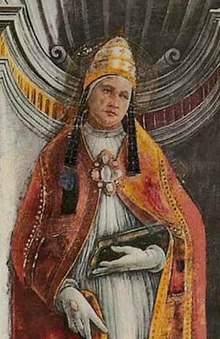Pope Evaristus
Evaristus | |
|---|---|
| Bishop of Rome | |
 Pope Evaristus, 15th century | |
| Church | Early Church |
| Papacy began | c. 100 |
| Papacy ended | c. 108 |
| Predecessor | Clement I |
| Successor | Alexander I |
| Personal details | |
| Born | |
| Died | c. 108 Rome, Roman Empire |
| Sainthood | |
| Feast day | 26 October |
Pope Evaristus (Greek: Ευάριστος) was the bishop of Rome from c. 99/100 to his death in 107/108.[1][2] He was also known as Aristus and is venerated as a saint in the Eastern Orthodox Church,[3] the Catholic Church, and Oriental Orthodoxy. It is likely that John the Apostle died during his reign period, marking the end of the Apostolic Age.
Biography
[edit]
According to the Liber Pontificalis, he was a Greek by birth, fathered by a Jew named Judah from the city of Bethlehem.[4] Eusebius, in his Ecclesiastical History, states that Evaristus took office in the 3rd year of Trajan's reign,[5] which correspond to AD 99/100,[6] and died in the 12th year of the same reign (AD 108/109) after holding the office for nine years.[7] He divided titles among the priests in the city of Rome, and ordained seven deacons to assist with the bishop's preaching.[4]
According to Reverend John F. Sullivan, Evaristus decreed that “in accordance with Apostolic tradition marriage should be celebrated publicly and with the blessing of the priest”.[8] Liber Pontificalis further describes him as the one "crowned with martyrdom".[4] The same is indicated also by French historian Alexis-François Artaud de Montor.[9] However, in the Roman Martyrology he is listed without the martyr title, with a feast day on 26 October.[10]
Pope Evaristus is buried near the body of Saint Peter in the Vatican, in the Saint Peter's tomb under the Saint Peter's Basilica.[11]
See also
[edit]References
[edit]- ^ Herbermann, Charles, ed. (1913). . Catholic Encyclopedia. New York: Robert Appleton Company.
- ^ According to Annuario Pontificio, he died in 108.
- ^ "Orthodox England – The Holy Orthodox Popes of Rome".
- ^ a b c Loomis, Louise Ropes (2006) [1917]. The Book of the Popes (Liber Pontificalis). Arx Publishing, LLC. pp. 9–10. ISBN 978-1-889758-86-2. See also the original Latin.
- ^ Ecclesiastical History VIII, 34 (Eusebius first states Evaristus hold the office for 9 years). The truth is, as the monarchical episcopate was not yet existing in Rome, it is useless to attempt to fix his dates, or those of any of the other so-called bishops who lived before the second quarter of the second century.
- ^ Burgess, Richard W. (1999). Studies in Eusebian and Post-Eusebian Chronography. Franz Steiner Verlag. p. 29. ISBN 978-3-515-07530-5. More exactly, the period between October AD 99 and October AD 100 according to the calendar of Caesarea Maritima.
- ^ Ecclesiastical History IX, 1. He writes 9 years in Book VIII, but writes 8 years in Book IX.
- ^ Sullivan, Reverend John F. (1918). The Externals of the Catholic Church. Aeterna Press.
- ^ Alexis-François Artaud de Montor (1911). The lives and times of the popes : including the complete gallery of the portraits of the pontiffs reproduced from "Effigies pontificum romanorum Dominici Basae": being a series of volumes giving the history of the world during the Christian era. p. 21 – via archive.org. Quote: "Ignatius died of the wounds that were inflicted by ferocious beasts; Evaristus died under the hands of executioners, more cruel than the wild beasts themselves."
- ^ "Martyrologium Romanum" (Libreria Editrice Vaticana 2001 ISBN 88-209-7210-7)
- ^ List of popes
External links
[edit]- Writings attributed to Pope St Evaristus
- Patron Saints Index: Pope Saint Evaristus
- Catholic Online – Saints & Angels: St. Evaristus
- Chisholm, Hugh, ed. (1911). . Encyclopædia Britannica (11th ed.). Cambridge University Press.
